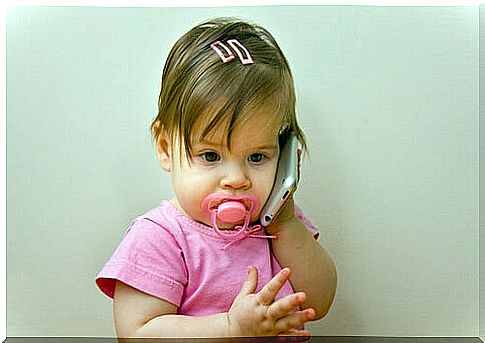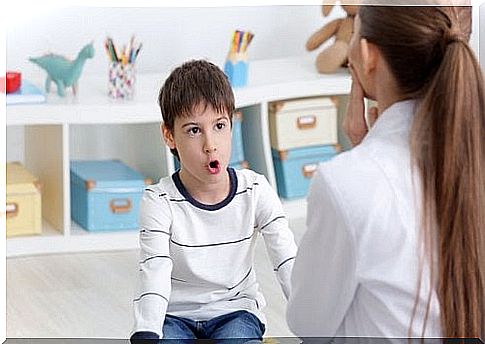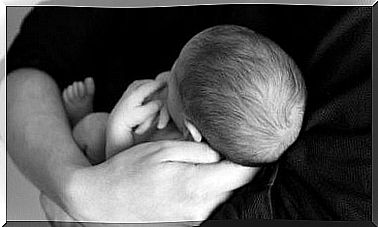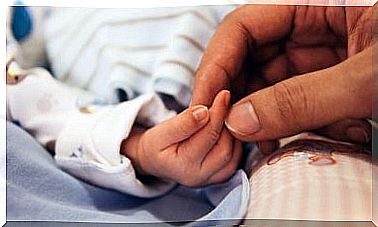Language Development: When Do I Have To Worry?

When a baby has reached a certain age and still doesn’t speak, a lot of parents worry. This is a dilemma that many parents find themselves in when their child does not say a word. Learn more about language development and which warning signs you shouldn’t ignore here.
The moment comes when the baby grows up when parents evaluate their child’s development and question a few points. “It’s already 2 years old and still doesn’t speak, just a few words.” This is how parents often express their concerns about language development . What should be done in these cases?
Of course, there is an average of the time it takes a child to start uttering their first words. But each individual has their own time for each new milestone in development.
From a very early age, children express that their natural development is perfectly fine. For example, if they react with their eyes to the voices of those around them, laugh spontaneously or babble to themselves, this is a sign that there are no speech or hearing problems.
Often times, upbringing is the reason the child does not make sounds or pronounce them correctly. Then the child has adopted this behavior only out of laziness or because of a faulty upbringing.
Nevertheless, this inner voice that says, “My child still doesn’t speak” creates fear in many parents. They find it hard to believe that it is an act of laziness and so they wait a long time before seeing a specialist who can make a diagnosis.
In the event that children are two years old and have few or no words to articulate, it is time to seek help from the pediatrician. He can assess the correct language development.
Here it is important that the diagnosis is made early. Often times, a delay in language development can mean a major disruption.
For a positive stimulation of speech in children, parents must accompany the process at all times. Reading stories and talking together during the day to strengthen communication from a very young age will help improve language skills.
“There is a language in the world that everyone understands: it is the language of enthusiasm, of things that are done with love and will, in search of what we want or what we believe in.” -Paulo Coelho-
Suggestions for parents of children with language problems
Instead of taking a passive stance when my child is still not speaking, I can get involved and collaborate to help them develop this skill.
- Children learn language by listening to people around them, mainly through imitation. You will always be an example to them: speak clearly and slowly.
- Ensure intensive communication with your child. This already begins in the breastfeeding age. Encourage them to imitate your sounds.
- Don’t laugh when it makes phonological mistakes.
- Play a lot with your child so you can teach them sounds of animals and other things.

Signs of problems with language development
When should you worry if your child isn’t speaking yet? Look out for these signs:
- If, at the age of 12 months, he has not yet used his hands, for example to gesture a greeting.
- When at 18 months there is still no sound or the words are incomprehensible.
- If at 24 months he does not speak complete sentences or only imitates sounds.
Most common causes of speech delays
Organs of speech
It is possible that the delay in speech was due to problems in the mouth, tongue, or roof of the mouth. To exclude this cause, it is necessary to have the child examined by a specialist.
Auditory
If a child hears poorly, they will not be able to understand the language of those around them. Because of this, it can make mistakes in the pronunciation of the words.
Speech motor skills
When there are problems in areas of the brain responsible for articulating speech, the tongue, lips, and jaw cannot coordinate properly.

When should I see a specialist if my child is not yet speaking?
Some parents may not realize that their children have a bigger problem with language development. Once they understand that professional help is needed to deal with the problem, the path becomes a lot easier.
After identifying the causes that are causing the delay, it is the pediatrician who needs to refer the child to a specialist. Early intervention by the speech therapist will help the child develop favorably.
This specialist is responsible for diagnostics, prevention and future treatment related to language and pronunciation. Strictly speaking, the term speech therapy consists of two Greek words: Logos, which means “words”, and Paideia, which means “education”. Finally, the therapist will work with the children to improve their language skills. In the same way, the parents are shown various exercises that they should do at home with the child.









